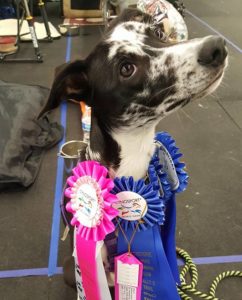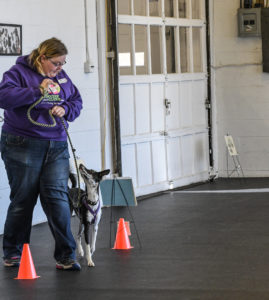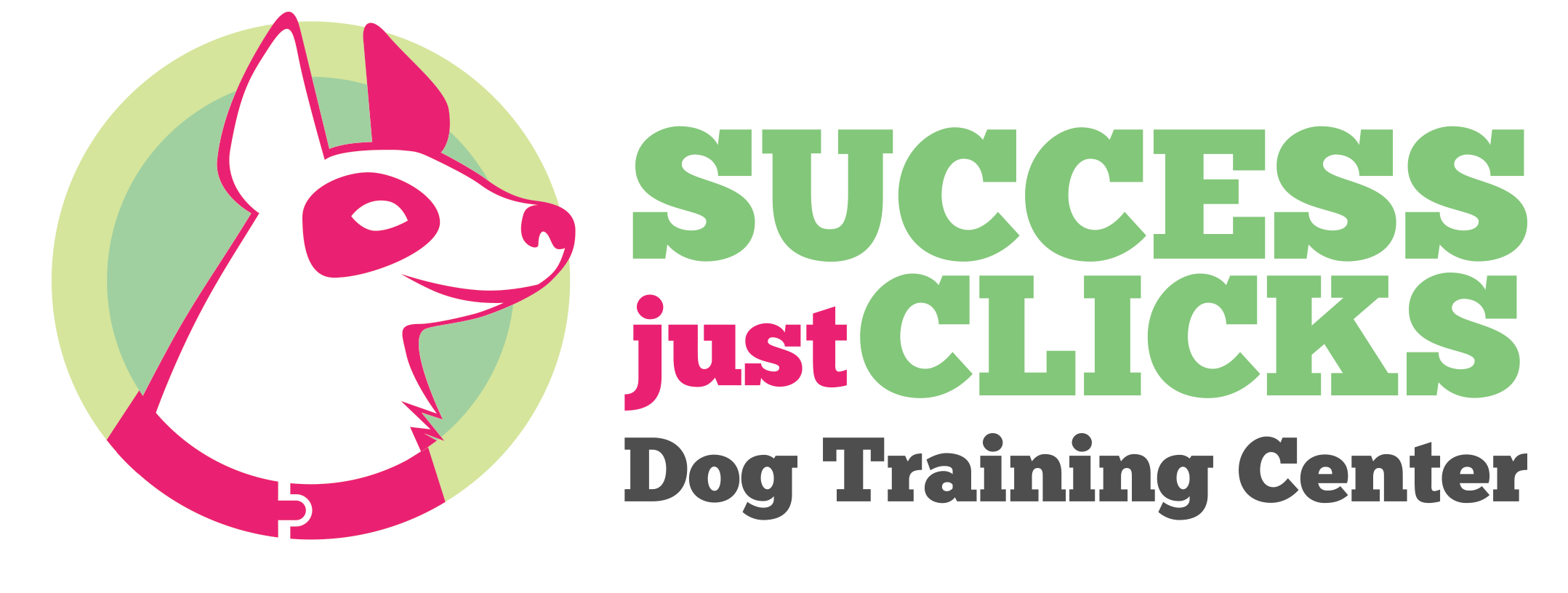Wise Choices in Dog Sports
Are handlers setting their dogs and themselves up to fail by listening to old wives’ tales?
I overheard a conversation recently at a training club that had me mentally furrowing my brow and shaking my head in disagreement (from across the room [it was a loud conversation]). The conversation was expressing an opinion that seems to be taking over my regional area with regards to Rally-O and one I question a bit. I wanted desperately to step in and give a different perspective to try and help this novice team have some other food for thought so they could be successful, because I want them to be successful.

Oswin with her RLPX1 Title ribbon and her four first place ribbons from that trial.
I am, and will always be a firm believer in setting my dog and myself up to succeed (*now, I’m not perfect and have definitely gambled at times but if I am definitely not betting on a long shot). If nothing else, I want to be consistently successful and meet whatever criteria I set (and the criteria for success is not always the same and certainly isn’t the same dog to dog). I want to be fully confident and happy with my performances before I make things more difficult. I believe not doing so, sets people up to fail and can be horribly demotivating and can lead to frustration with the dog. I want happy and confident competitors and dogs!
The conversation I overheard went something like this:
Novice Handler 1: That was Zuri’s second Q in level 1! One more and we’ll get a level title!
Handler : That’s excellent! Are you then going to go on to level 2a next?
Novice Handler 1: I think so. My instructor said I should do 2a and then go back to working on 1b for the level championship.
Handler : Yeah, it makes sense to get your 2a first and then work on 1b.
Novice Handler 1: We’ll see how it goes, this is his first trial and we are still learning.
Handler: You’ll be fine, you should definitely go for your 2a next!
Now, there are absolutely some dogs who have the foundation training and handlers with the handling experience to go through all the levels successfully with no big hiccups (Shayne and Rio both did this even with a goofball newbie as a handler, thank goodness they have such good foundations!) but for many dogs, that is simply not the case. The novice handler’s dog was young and very green–they had Q’ed with scores in the low 180s (qualifying is 170, perfect is 210). Although happy in the ring, the dog was not terribly connected to his owner, was a good bit distracted, and it was clear they had a lot of foundation skills to work on to improve.
I want this team to feel confident in their abilities before ever taking that leash off in the ring. They have such potential as a team to be awesome (because they both LIKE what they are doing), but it looks like they could really be helped by focusing on foundation skills to build confidence and fluency. I worry that suggesting they rush into 2a will result in a demotivated team and in turn a team that will either quit, or resort to using corrections, or lose their joy. How many NQs (non qualifying scores) can a team get trying for a level title before quitting or feeling frustrated enough and blame it on the dog
Instead of rushing through all the levels, I really think that focusing on mastering all the skills at the lower levels first is important. If you are barely earning qualifying scores in a lower level, the jump to the next level is going to be exceedingly challenging. This isn’t to say that you should not start training higher level skills early on (I’m working on retrieve, down on recall, and moving down at heel with Oswin right now), but I think rushing through does a serious disservice to our dogs… and suggesting that others rush through is a disservice to those teams. I want my students to feel confident in their performance with their teammates!
Oswin recently earned her RLPX1 (Rally Puppy Championship title) with scores of 206, 206, 208, 210 (out of 210). She did beautifully and our foundation work held us together quite nicely. Even though she had solid scores, was having a blast in the ring with me, and was an excellent worker, I do not plan on entering her in Level 1 until we clean up some things and we’ve built more duration between treats. Depending on timing, I may enter her before I really start teaching her a competition heel (because her loose leash walk in the ring is tight enough to meet judging criteria), but we’ll stay in level 1 until we have mastered that level’s skill set AND have solid heel. There are some foundation things she’s very good at but definitely still holes in our training that need to be addressed before I tried to build on them for higher level skills.
So what would my advice be to a novice team that has earned their level 1 title but did so with scores closer to the 170 mark rather than the 210?

Oswin working hard on a serpentine on her last run of the trial, her 210 score.
In the case of moving from level 1 on-leash to level 2 off-leash, I firmly believe you must first master the level 1 skills in your training sessions and during trials (we all have experienced the dog who can do it at home but for a variety of reasons, is not successful in the ring). If you were struggling with focus and heeling ON leash, you are not setting yourself up to succeed when you take the leash off. When you feel you have mastered those skills in a trial environment, are consistently getting the attitude and scores you want in the ring, and you feel prepared with the next level’s skills, that’s when I would suggest bumping up. If anyone of those things are missing, you might be able to ‘fake it’ in lower levels but the holes will be glaring deficiencies as you move up in levels.
If you are interested in kicking up your precision or starting your new dog off right with precision, check out our Sport Dog Foundations class that is set to start 1/7/17!
(Yes, we can talk about the elephant in the room that this is the first post I’ve written in over 2 years. I’m not promising to blog all the time again [that won’t be happening], but if I have something to say or information to share, I’m recommitting myself to posting new content periodically! So stay tuned!)
